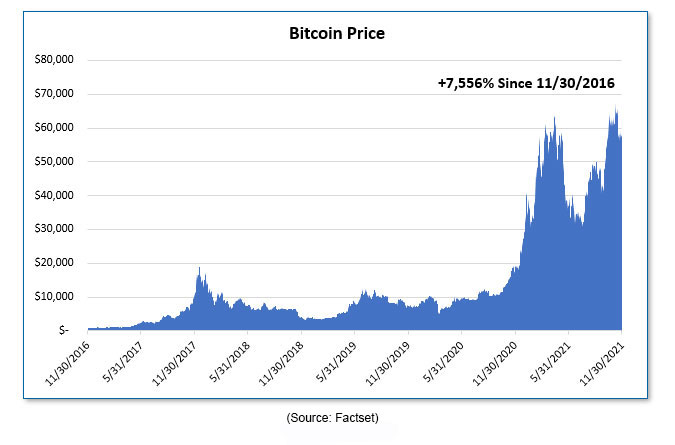Does Bitcoin Belong in a Traditional Investment Portfolio?

By Fred Huang
Senior Investment Analyst
February 7, 2022
As market activity around Bitcoin reaches historic levels, retail and institutional investors alike are increasingly interested in the cryptocurrency as an investment option.
This curiosity makes sense given Bitcoin’s astronomical rise in price over the last few years. Indeed, Bitcoin has outperformed every other type of asset in the past half decade, returning its investors 7,556% since November 2016.

While this return is certainly impressive, we should provide context and learn more about Bitcoin before considering whether it’s appropriate for your portfolio.
What is a Bitcoin?
Originating from a cryptographic white paper in 2008, Bitcoin is intended to be a peer-to-peer payment system that is “decentralized,” or not reliant on a financial intermediary. Bitcoins are, simply put, numbers on a digital ledger. This common ledger, which is shared and validated among hundreds of millions of computers in its network, is called a “blockchain.” For a payment system, this type of verification process greatly reduces the chance of counterfeiting or double spending.
Like all currencies not backed by a physical commodity like gold, also known as “fiat currencies,” Bitcoin has no intrinsic value. Its price is driven purely by supply and demand, as well as its increasing acceptance as a form of payment. Since its inception, rampant speculation and an uncertain regulatory environment have contributed to its extreme price volatility.
How is Bitcoin created? 1
Bitcoins are generated through a process called “mining.” Computers connected to the network “mine” new coins by processing transactions within the network. Each batch of completed/processed transactions is called a “block.” These “blocks” are added to the history of the distributed ledger—thus creating a chain of “blocks,” or “blockchain.”
Every time a block is completed and added to the ledger, a reward of a few new Bitcoins is randomly distributed among the miners processing transactions. This reward diminishes over time and will ultimately disappear after 21 million Bitcoins are created. A fee for processing transactions, which is paid by the outgoing account, is also distributed among the miners.
Why is there so much interest?
Beyond its remarkable returns over the past several years, some believe Bitcoin can make an impact in the financial community. For example, proponents believe Bitcoin has an advantage over conventional currencies because it lacks a central authority who can “print” more bitcoins at will. This is appealing to some investors because the total number of coins that will exist is capped. When central banks increase the money supply, investors become fearful of inflation and some may look to alternatives, like Bitcoin, as a store of value.
Others feel that Bitcoin can reduce risk in digital payment processing, make transferring money more efficient and/or contribute to solutions in the growing decentralized finance, or “DeFi,” movement.
Does Bitcoin have a place in an investment portfolio?
Investment portfolios are typically built to balance and optimize risk and expected return.
A bitcoin’s price is highly speculative and based purely on what the next person is willing to pay. Normally, an investment’s return can be modeled with future cash flows, dividends or interest. Bitcoin exhibits none of these characteristics, making the projection of an expected return extremely difficult. Hence, we do not view Bitcoin as an “investment.”
What is clear is that holding Bitcoin would dramatically increase the volatility of a fund, while having no predictable impact on its risk/return profile. Bitcoin and other cryptocurrencies are still a relatively new and untested asset, which have yet to prove long-term viability.
Does Wespath hold cryptocurrencies?
In short, no. While the Wespath funds do have exposure to companies that own cryptocurrencies, such as Tesla (TSLA) and Square (SQ), we do not speculate in the direction of currency, digital or otherwise. Wespath does consider exposure to certain currencies a source of diversification, but there isn’t enough data to demonstrate that Bitcoin would have a long-term positive diversifying effect on the Wespath funds.
1https://www.bitcoin.com/get-started/what-is-bitcoin-mining/